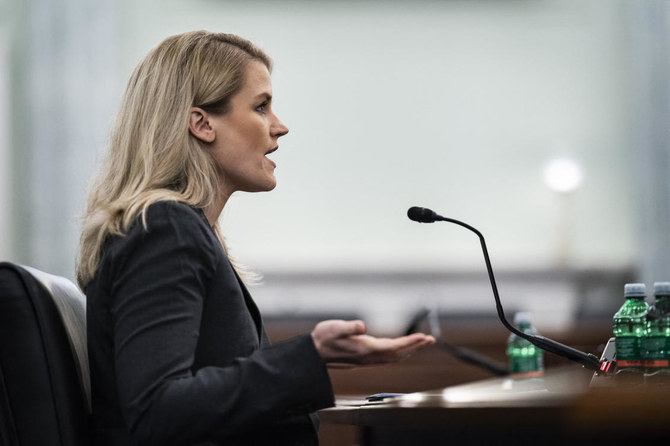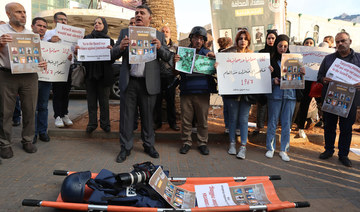WASHINGTON: Facebook has recently taken a harsher tone toward whistleblower Frances Haugen, suggesting that the social network could be considering legal retaliation after Haugen went public with internal research that she copied before leaving her job earlier this year.
US law protects whistleblowers who disclose information about potential misconduct to the government. But that protection doesn’t necessarily cover taking corporate secrets to the media.
Facebook still has to walk a fine line. The company has to weigh whether suing Haugen, which could dissuade other employees who might otherwise speak out, is worth casting itself as a legal Godzilla willing to stomp on a woman who says she’s just doing the right thing.
Haugen may face other consequences. Whistleblowers often put themselves at risk of professional damage — other firms may be reluctant to hire them in the future — and personal attacks from being in the public eye.
Facebook did not respond to emailed questions.
What did Haugen do?
Haugen secretly copied a trove of internal Facebook documents before leaving the company and subsequently had her lawyers file complaints with the Securities and Exchange Commission alleging that Facebook hides what it knows about the negative effects of its platform.
John Tye, her lawyer, said the team gave redacted documents to Congress, where Haugen testified on Tuesday, and also informed officials in California. Haugen also shared documents with the Wall Street Journal, which she started talking to in December, leading to a series of explosive stories that began in mid-September.
What was Facebook's response?
The company says it has been mischaracterized. “I think most of us just don’t recognize the false picture of the company that is being painted,” CEO Mark Zuckerberg wrote to employees on Tuesday.
Some company officials have also begun using harsher language to describe Haugen’s actions that could be interpreted as threatening.
In an Associated Press interview Thursday, Facebook executive Monika Bickert repeatedly referred to the documents Haugen copied as “stolen,” a word she has also used in other media interviews. David Colapinto, a lawyer for Kohn, Kohn and Colapinto who specializes in whistleblower cases, said that language was threatening.
In the same interview, asked if Facebook would sue or retaliate against the whistleblower, Bickert said only, “I can’t answer that.”
A week earlier, Antigone Davis, Facebook’s head of global safety, testified in the Senate that Facebook “would never retaliate against someone for speaking to Congress,” which left open the possibility that the company might go after her for giving documents to the Journal.
Is Haugen protected?
Various laws offer whistleblower protection at both the state and federal levels. The federal laws applicable to Haugen are the Dodd-Frank Act, a 2010 Wall Street reform law, and the Sarbanes Oxley Act, a 2002 law that followed the collapse of Enron and other accounting scandals.
Dodd-Frank expanded protections for whistleblowers and empowered the SEC to take action against a company that threatens a whistleblower. Protections exist for both employees and former employees, experts say.
Asked about her risk because she went to the media, Haugen’s lawyer, Tye, maintains that because Haugen went to the SEC, Congress and state authorities, she’s entitled to whistleblower protections. He said any suit from Facebook would be “frivolous” and that Facebook has not been in touch.
What about her leaks to the media?
Courts haven’t tested whether leaking to the media is protected under Dodd-Frank, but Colapinto said the US Secretary of Labor determined decades ago that environmental and nuclear-safety whistleblowers’ communications with the media were protected. He argues that the language of Sarbanes-Oxley is modeled on those earlier statutes, and Haugen should have the same protections for any of her communications with reporters.
Facebook could allege that Haugen broke her nondisclosure agreement by sharing company documents with the press, leaking trade secrets or just by making comments Facebook considers defamatory, said Lisa Banks of Katz, Marshall and Banks, who has worked on whistleblower cases for decades. “Like many whistleblowers, she’s extraordinarily brave and puts herself at personal and professional risk in shining a light on these practices,” she said.
Haugen effectively used leaks to the media to turn up the pressure on Congress and government regulators. Colapinto said her disclosures had a public-interest purpose that could complicate enforcing the NDA if Facebook chose to do so.
Could Facebook face blowback?
Facebook probably wants its veiled threats to unnerve other employees or former employees who might be tempted to speak out. “If they go after her, it won’t be because they necessarily think they have a strong case legally, but sending a message to other would-be whistleblowers that they intend to play hardball,” Banks said.
But she said it would be a “disaster” for Facebook to go after Haugen. Regardless of potential legal vulnerabilities, Facebook might look like a bully if it pursued a legal case against her.
“The last thing Facebook needs is to rouse the ire of governmental authorities and the public at large by playing the role of the big bad giant company against the courageous individual whistleblower,” said Neil Getnick, whose firm, Getnick and Getnick, represents whistleblowers.
Could Facebook sue whistleblower Frances Haugen?
https://arab.news/48q7e
Could Facebook sue whistleblower Frances Haugen?

- Facebook still has to walk a fine line
Tunisia reduces jail term for TV host

- Tunisia’s Decree 54, the law under which Bssais was convicted, was enacted by Saied in 2022 to combat “false news”
TUNIS: A Tunisian appeals court commuted the prison sentence of a TV broadcaster from one year to eight months on Friday, his lawyer told AFP.
Borhen Bssais was initially handed a 12-month sentence under a decree punishing “spreading false information” and “defaming others or damaging their reputation.”
“The Court of Appeal in the capital Tunis decided to reduce Bssais’s sentence from 12 months to eight,” his lawyer, Nizar Ayed, said.
Bssais was arrested on May 11 and charged with “attacking President Kais Saied through radio broadcasts and statements between 2019 and 2022.”
Tunisia’s Decree 54, the law under which Bssais was convicted, was enacted by Saied in 2022 to combat “false news.”
But critics have said it has been used to stifle political dissent as the country prepares for a presidential election set for October 6.
Over the past 18 months, more than 60 critical voices have been prosecuted under the decree, according to the National Union of Tunisian Journalists.
Amnesty International Secretary General Agnes Callamard said on Friday she found it “alarming and distressing to witness the drastic rollback of the human rights progress that Tunisia had made since the 2011 revolution.”
“The institution of justice has been brought to heel, while arrests and arbitrary prosecutions are multiplying,” she said in a statement after a four-day visit to the country.
Saudi Ad School aims to educate women in Kingdom’s advertising sector through new program

- ‘The Name Behind Her Talent’ program is in partnership with Publicis Groupe Middle East
- Yearlong program begins in September
DUBAI: Saudi Ad School, a Saudi-based educational institute specializing in advertising courses, has partnered with marketing and communications network Publicis Groupe Middle East to launch “The Name Behind Her Talent,” a women’s empowerment program in the Kingdom.
The program aims to educate female talent involved in Saudi’s advertising industry through initiatives such as scholarships, educational courses, talks and mentorship sessions, workshops, and industry salons.
The latter are initiatives focused on “empowering women within the advertising field,” with each salon featuring up to three women who will “share their experiences, insights, and expertise with our students,” said Enas Rashwan, founder and president of Saudi Ad School.
“The Name Behind Her Talent” is for now exclusively focused on the Kingdom.
Rashwan told Arab News: “We want to establish a strong foundation here before considering expansion to other countries.”
The yearlong program begins in September. Saudi Ad School has developed an eligibility application with a scoring system that will be available on its website and distributed at industry events for the program’s scholarships, which include the institute’s courses, master classes and workshops, Rashwan added.
Other activities within the program will be open and free for all women, she said.
Bassel Kakish, CEO of Publicis Groupe, Middle East and Turkiye, said that the partnership “underscores our dedication to fostering talent development while contributing to the Kingdom’s Vision 2030 goals.”
He told Arab News: “Women’s empowerment is a specific area Publicis Groupe Middle East has been driving across the region, and this collaboration allows us to explore new opportunities with the future generation of leaders.
“Recognizing the immense potential of Saudi’s talent pool, it was a natural next step to combine our efforts for greater impact.”
Rashwan said that Publicis Groupe’s efforts in supporting women in advertising and its vision to foster talent in the Kingdom made the partnership a “natural fit.”
However, she added that the Saudi Ad School intended to “broaden its scope by forming partnerships with other prominent advertising networks.”
Rashwan has been running the Cairo Ad School in Egypt for nearly 12 years, and its success, “combined with strong demand from the Saudi market,” resulted in her decision to launch the Saudi Ad School last year, she said.
She added that the advertising sector in Saudi Arabia “is becoming more dynamic with a strong focus on digital transformation, creativity, and innovation, and we are seeing a shift towards content that resonates with Saudi culture and values, opening up exciting opportunities for advertisers.”
This evolution of the sector had created a demand for talent, making it an “opportune moment to introduce a program that equips students with the skills and knowledge needed to meet industry demands and contribute to the nation’s vision,” Rashwan said.
The program also aims to address some of the challenges women in Saudi face in the ad industry, she added, such as limited access to professional development opportunities; the need for more inclusive workplaces; and to have their “voices heard, and their opinions valued without hesitation or doubt, whether interacting with clients or within their teams.”
She said: “Saudi women are exceptionally driven and eager for achievements more than ever.
“By creating additional programs and opportunities, we aim to support their ambitions and enhance their contributions to the industry.”
Al Arabiya launches new podcast hub, Mazeej

- New podcasts aim to cater to global Arab audience
DUBAI: Al Arabiya Network has launched a new podcast hub, Mazeej, featuring shows on various topics including business, politics, arts and culture, health and wellness, and sport.
The podcasts are tailored to cater to Arab listeners of all ages around the world, according to a company statement.
The hub features contributions from Al Arabiya journalists and presenters, such as Nicole Tannoury, Layal Alekhtiar, Islam Al-Najjar, and Hanan Al-Masri.
In “Sasat,” Tannoury discusses political events with prominent politicians and experts and in “Wa Ma’a Ba’ad,” Alekhtiar analyzes current news stories.
“Heewar Teejari” with Al-Najjar features founders of major commercial brands sharing their experiences and learnings; and “Khalf Al-Jidar” with Al-Masri aims to spotlight the evolving Palestinian experience through interviews and testimonies.
Going beyond business and politics, “Masha’er” with Dr. Osama Al-Jamaa explores the human psyche, and “Jareema” with crime analyst Mohammed Alshaibani breaks down complex criminal cases.
In a bid to to cater to all Arab listeners, “Umm Al-Qossas” with Amro Zaki focuses on Egyptian society featuring interviews with inspiring figures from the country while “Yeman” with Ahad Yaseen chronicles the stories of Yemenis.
Mazeej is available on all major podcast platforms and YouTube.
Murdoch engaged in legal battle with children over succession, NYT reports

- Murdoch is trying to expand Lachlan Murdoch’s voting power in the Murdoch Family Trust to secure a majority and ensure that he cannot be challenged by the siblings, says report
Media mogul Rupert Murdoch is engaged in a legal battle against three of his children to ensure that his eldest son and chosen successor, Lachlan Murdoch, will remain in charge of his media empire, the New York Times reported on Wednesday.
Murdoch is trying to expand Lachlan Murdoch’s voting power in the Murdoch Family Trust to secure a majority and ensure that he cannot be challenged by the siblings, the report said, citing a sealed court document.
The Reno, Nevada-based family trust holds the family’s shares in Murdoch’s vast collection of television networks and newspapers through the companies News Corp. and Fox Corp. .
Lachlan Murdoch is chairman of News Corp, whose publications include the Wall Street Journal and the Sun, and chair and chief executive of Fox Corp.

The trust currently has eight votes: four controlled by Murdoch, and the remaining four controlled by the four children from his first two marriages. Murdoch’s youngest daughters, Chloe and Grace, from his third wife, Wendi Deng, do not have voting rights in the trust.
In court, Murdoch is arguing that having Lachlan Murdoch run the company without interference from his more politically moderate siblings — James, Elisabeth and Prudence Murdoch — will help preserve its conservative editorial stance, thus protecting the commercial value for all his heirs, the report said.
Fox Corp, News Corp, and Murdoch’s lawyer did not respond to Reuters requests for comment while the lawyer for the three children involved in the legal battle could not immediately be reached.
Fox News continues to be the number one US cable news network, playing an influential role in US politics, particularly among Republicans who prize Fox’s conservative-leaning audience.
Murdoch was that worried that a “lack of consensus” among his four children “would impact the strategic direction at both companies including a potential reorientation of editorial policy and content,” the report said, adding that he also wishes to hand Lachlan Murdoch “permanent” and “exclusive” control over the company, citing the court’s decision.
Global media watchdogs, human rights groups call on Biden to pressure Netanyahu regarding rising journalist deaths in Gaza

- CPJ CEO Jodie Ginsberg: Nine months into the war in Gaza, journalists … continue to pay an astonishing toll
- Ginsberg: More than 100 journalists have been killed. An unprecedented number of journalists and media workers have been arrested, often without charge
In letters signed by the Committee to Protect Journalists and seven other human rights and press freedom organizations, President Joe Biden is being urged to press Israeli Prime Minister Benjamin Netanyahu on the rising number of journalists killed in the Gaza Strip and the near total ban on international media entering the enclave.
The letters call on Washington to “ensure that Israel ceases the killing of journalists, allows immediate and independent media access to the occupied Gaza Strip, and takes urgent steps to enable the press to report freely throughout Israel and the Occupied Territories,” while also detailing the number of grave press freedom violations and the response of total impunity.
The letters were signed by Amnesty International USA, Freedom of the Press Foundation, Knight First Amendment Institute, the National Press Club, PEN America, Reporters Without Borders, and the Tahrir Institute for Middle East Policy.
The Israeli PM is expected to meet with Biden on Tuesday and is scheduled to attend a joint session of Congress on Wednesday.
Since the beginning of the Israel-Hamas war last October, the Israeli government’s actions have created what the letter describes as a “censorship regime.”
In a video message to Netanyahu last week, CPJ CEO Jodie Ginsberg said: “Nine months into the war in Gaza, journalists … continue to pay an astonishing toll.
“More than 100 journalists have been killed. An unprecedented number of journalists and media workers have been arrested, often without charge. They have been mistreated and tortured.”
Israel’s persistent impunity in attacks on journalists has also affected the rights and safety of two American journalists: Shireen Abu Akleh, who was murdered in 2022, and Dylan Collins, who was injured in an Oct. 13 strike by Israel on journalists covering the conflict in south Lebanon. The strike killed Reuters photographer Issam Abdullah and wounded others who were visibly wearing press insignia.
Investigations conducted by Amnesty, Human Rights Watch, AFP and Reuters found the attack was more than likely targeted.
On Sunday in Vincennes, France, Collins joined his AFP colleague Christina Assi who lost her right leg in the same attack as she carried the Olympic flame in honor of journalists killed.
CPJ, which continues to urge decisive action by the US government on journalist safety and media access to Gaza, called on Biden to guarantee in his meeting with Netanyahu that the Israeli government take the following steps:
— Lift its blockade on international, Israeli, and Palestinian journalists from independently accessing Gaza.
— Revoke legislation permitting the government to shut down foreign outlets and refrain from any further legal or regulatory curtailment of media operations.
— Release all Palestinian journalists from administrative detention or who are otherwise held without charge, including those forcibly disappeared.
— Abjure the indiscriminate and deliberate killing of journalists.
— Guarantee the safety of all journalists and allow the delivery of
newsgathering and safety equipment to reporters in Gaza and the West Bank.
— Allow all journalists seeking to evacuate from Gaza to do so.
— Transparently reform its procedures to ensure that all investigations into alleged war crimes, criminal conduct, or violations of human rights are swift, thorough, effective, transparent, independent, and in line with internationally accepted practices, such as the Minnesota Protocol. Investigations into abuses against journalists must then be promptly conducted in accordance with these procedures.
— Allow international investigators and human rights organizations, including UN special rapporteurs and the UN Independent International Commission of Inquiry on the Occupied Palestinian Territory and Israel, unrestricted access to Israel and the Occupied Territories to investigate suspected violations of international law by all parties.
The letter was also sent to Senate Majority Leader Chuck Schumer, House Minority Leader Hakeem Jeffries, Senate Minority Leader Mitch McConnell and House Speaker Mike Johnson.






















